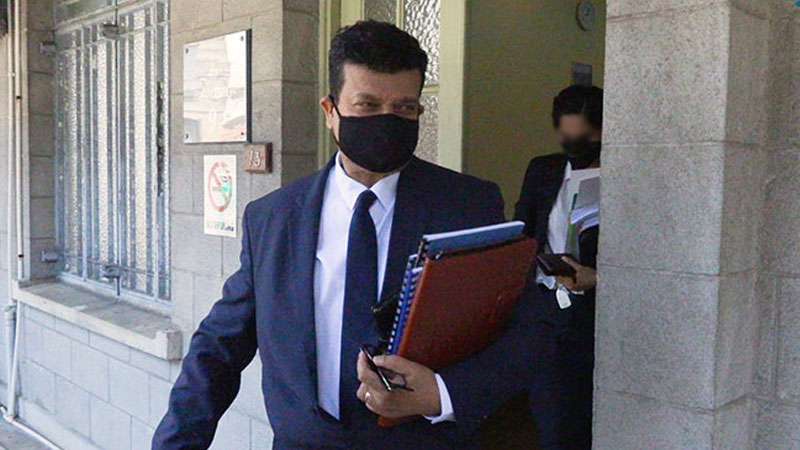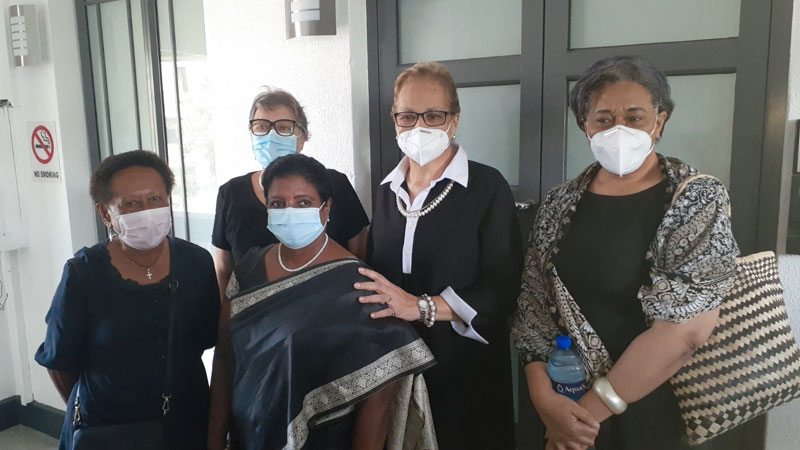
Devanesh Sharma who is representing the Attorney General's Office, the Supervisor of Elections and the State in the case where 7 women have filed a constitutional challenge against the Electoral Registration of Voters Amendment Act and the Interpretation Act says the case is not about 100,000 women in the country but only about the 7 women who have filed the case.
Sharma says Jon Apted who is representing the 7 women should not get emotional and talk about 100,000 and just talk about what is in court.
He says these 7 women do not speak for the majority of the women in Fiji and they are in fact a minority.
Sharma says the law is not forcing these women to do anything and it is their choice if they want to change their name according to the birth certificate or not.
Sharma adds in order to be fair to these people, the State has removed the requirement for a deed poll and people just have to fill out a form to change their name where they do not even have to pay anything.
He says the law was enacted well before the elections and people have had enough time to register for a name change.
Sharma says people do not even have to go anywhere for a name change as officials from the Fijian Elections Office will go to them.
He says if people do not comply with the law then they will not be allowed to vote and this is still their choice.
Sharma says every single affidavit deposed by the 7 complainants was in a name that was different from the name on their respective birth certificates.
He says Apted argued that each of these affidavits are in defiance of the provisions of the Interpretation Act which states that where any written law requires any party to put forth their name, that person must state his or her name as it appears on their birth certificate.
Sharma says the complainants had annexed copies of their birth certificates to their affidavits but had deposed the affidavits in the assumed names.
He says the court should not consider these affidavits.
Sharma also says very rarely does the court strike down a law which the Constitution recognizes and this law is not in breach of any constitutional right.
He adds this law is not just about women because there are a number of men who are also using other names except for the name in their birth certificate.
The 7 women supported by the Fiji Women’s Rights Movement and the Fiji Women’s Crisis Centre have filed the constitutional challenge on the grounds of sex, gender and marital status discrimination and also on the basis that it violates the privacy and social and cultural identity of 100,000 Fijian women.
The 7 women are Lavinia Rose Bernadette Rounds Ganilau, Shiromani Priscilla Singh, Adi Davila Toganivalu, Elizabeth Reade Fong, Leba Seni Nabou, Yasmin Nisha Khan and Salote Raikolo Qalo.
They have filed the case against the Attorney General, the Supervisor of Elections and the State.
The 7 women are seeking a declaration that section 3 of the Electoral (Registration of Voters) (Amendment) (No. 2) Act 2021 and the amendments made thereby to section 4 of the Electoral (Registration of Voters) Act 2012 and the Interpretation Act are in breach of their rights under section 23 of the Constitution including their rights to free, fair and regular elections under the Constitution, to be registered as a voter, and to vote by secret ballot in any election under the Constitution.
By Rashika Kumar,Vijay Narayan
Thursday 24/02/2022

The lawyer of the 7 women who have filed a constitutional challenge against the Electoral Registration of Voters Amendment Act and the Interpretation Act, Jon Apted says the new laws are arbitrary because there is no justification for it.
The 7 women supported by the Fiji Women’s Rights Movement and the Fiji Women’s Crisis Centre have filed the constitutional challenge on the grounds of sex, gender and marital status discrimination and also on the basis that it violates the privacy and social and cultural identity of 100,000 Fijian women.
The 7 women are Lavinia Rose Bernadette Rounds Ganilau, Shiromani Priscilla Singh, Adi Davila Toganivalu, Elizabeth Reade Fong, Leba Seni Nabou, Yasmin Nisha Khan and Salote Raikolo Qalo.
They have filed the case against the Attorney General, the Supervisor of Elections and the State.
Apted says the new laws if constitutional or valid, states that women must make a choice where they must change their name on the birth certificate to their adopted married name.
He says in addition to this, their right to vote and other right is restricted until they change their name.
Apted says that while adopting their married name, these women did not renounce their family name.
The Munro Leys lawyer adds the new law forces them to change their name without a proper justification and suspends their right to vote.
He says the new law on its face does not discriminate but it disproportionately affects women therefore it is indirectly discriminatory.
The lawyer further says where it is indirect discrimination, the State must justify the discrimination.
Apted says it is illogical to produce a birth certificate which attest that the affected women were born with the name of the husband which is not true.
At this point some women present in court had laughed out loud and Chief Justice Kamal Kumar had ordered these women to identify themselves and get out of the court, however when no one stood up, the proceedings were allowed to continue.
Apart from the 7 plaintiffs, Fiji Women’s Crisis Centre Coordinator, Shamima Ali, FWCC Legal Officer, Stephanie Dunn, Fiji Women’s Rights Movement Executive Director, Nalini Singh, international human rights lawyer, Imrana Jalal and other women’s rights activists were some of the women present in court today.
Apted further says under the International Covenant on Civil and Political Rights which Fiji is a signatory to, states restrictions are permitted but it must be reasonable.
He adds the State has to answer if the change in the law was necessary and if it was, is there a better way to do it.
Apted also says the State has not provided a legitimate aim and it does not explain how the changes make the elections fairer.
He stresses the Supervisor of Elections in a press release did not explain what the problem was with the law and why changes have been made.
He says a birth certificate is not an identification but it is a registration of a birth.
Apted also adds name, birth certificate, photo and thumb print are required when registering to vote and technology can easily identify a duplicate registration.
He says there were 78 cases noted when individuals had attempted to register more than once and this was picked up before the requirement of the name on the birth certificate for registering.
Apted says the defendants say a birth certificate is the primary identification document but the Births, Deaths and Marriages Act does not say that at all.
He adds the defendants say a birth certificate can result in double registration but they do not explain how.
The Munro Leys lawyer says by moving from other forms of identification to using a birth certificate can actually open up opportunity for more fraud where a person can use the birth certificate of someone who has emigrated to register.
He adds that ink is applied when voting but that person can vote twice through postal voting.
Apted says the State has not shown any problems and how the change in the law improves it.
He submits the law appears to be gender neutral but it disproportionately impacts women and married women.
The 7 women are seeking a declaration that section 3 of the Electoral (Registration of Voters) (Amendment) (No. 2) Act 2021 and the amendments made thereby to section 4 of the Electoral (Registration of Voters) Act 2012 and the Interpretation Act are in breach of their rights under section 23 of the Constitution including their rights to free, fair and regular elections under the Constitution, to be registered as a voter, and to vote by secret ballot in any election under the Constitution.
They are also seeking a declaration that the amendments made are in breach of their rights under section 24(1)(c) of the Constitution of the Republic of Fiji to personal privacy, in particular respect for their family life and a further declaration that the new laws are in breach of their rights under section 26 of the Constitution including their rights to equality before the law, and equal protection, treatment and benefit of the law, full and equal enjoyment of all rights and freedoms recognised in Chapter 2 of the Constitution and under written law, and not to be unfairly discriminated against directly or indirectly on the grounds of their actual or supposed personal characteristics or circumstances, including their sex, gender, and/or marital status.
They are seeking a declaration that the amendments by reason of inconsistency with the Constitution are under section 2 of the Constitution invalid and of no force or effect. The women are further seeking an order that the Supervisor of Elections take all necessary steps to enable Yasmin Nisha Khan and all other persons who have amended their names on the National Register of Voters from their adopted married names to their birth certificate names as a consequence of the Electoral (Registration of Voters) (Amendment) (No. 2) Act 2021 to revert from their birth certificate names to the names under which they previously appeared on the National Register of Voters.
The Electoral Registration of Voters Amendment Act requires the application for registration as a voter to State the person’s full name as specified on his or her birth certificate and to also be accompanied by his or her birth certificate.
If a person was registered to vote with their married name or not their birth certificate name, then they have to re-register to vote with their birth certificate name or get an amendment done to their birth certificate by adding their married name or preferred name.
The Government had earlier said that with the new law, the women can decide themselves if they want to change their names, and all they have to do is go to the Births, Deaths and Marriages Office, fill out the form and a new birth certificate with the changed name will be done.
The ruling will be delivered on notice.
Stay tuned for the latest news on our radio stations

